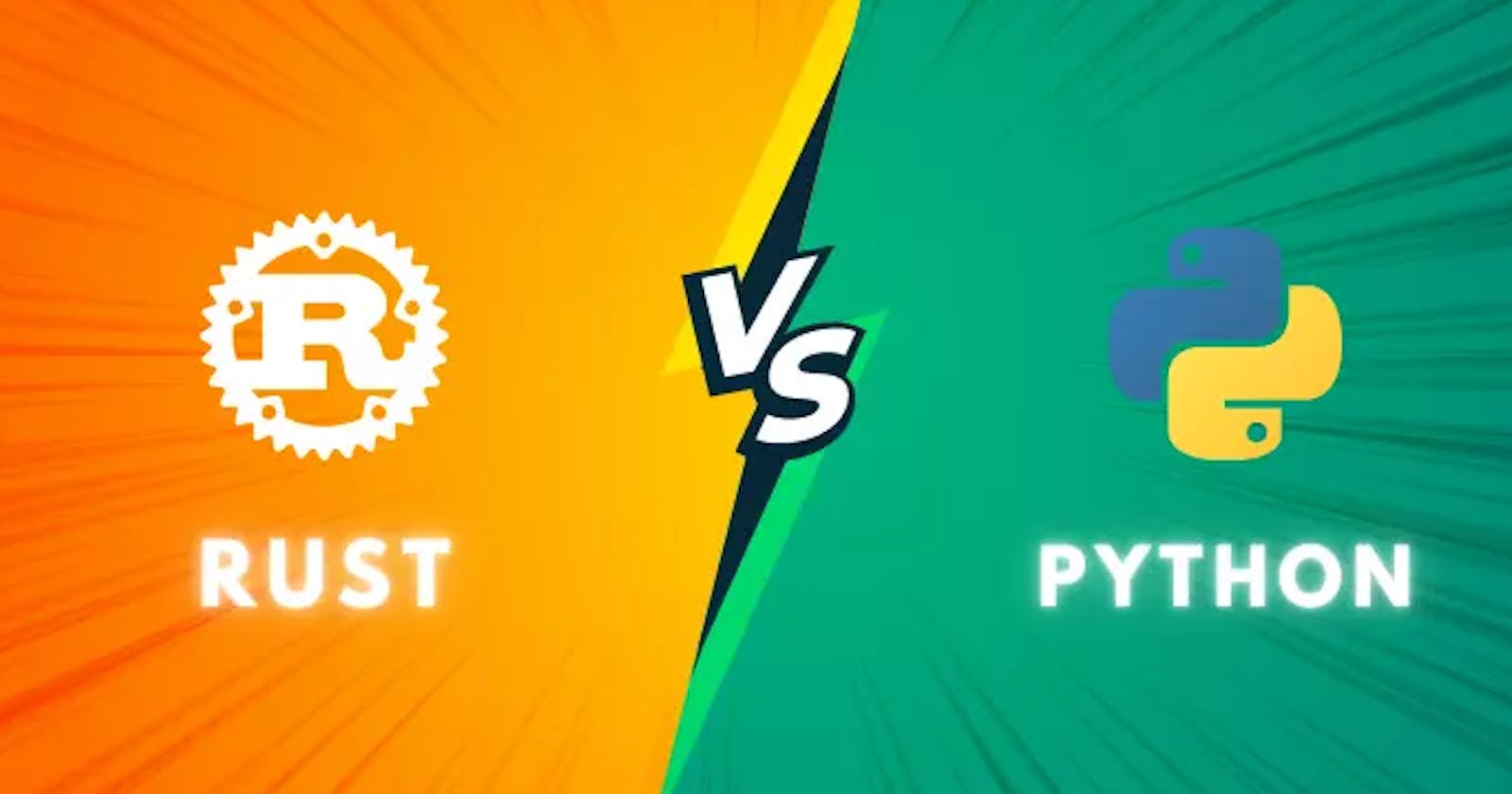Python and Rust are two popular programming languages use to write code and develop applications. While Python is an established and almost ubiquitous programming languages, Rust is more of an up-and-coming language which is quickly growing popular in the software developer community.
This article will compare the features of Python and Rust, as well as the pros and cons of each, so you can decide which one will work best for your next project. First, let’s define each of these languages.
What is Rust?

Rust was developed from C++ with more safe scripts in 2010. The language is open source. Rust has a high-performance graph when compared with C++ or C language. Rust has many curly brackets and indentation is not necessary at all. Memory management is done through the RAII convention in Rust. Rust compiler is able to infer the type of variable, argument, function from the context or syntax it is typed. Now type state is removed from Rust that is achieved through branding pattern.
There is a Builder pattern in Rust that allows describing the current state of an object into the type of that object. Rust does not have classes as defined but it works with type structures and implementations. There were many changes while the version was updated in Rust. This reason made Rust less popular among developers. Inheritance and polymorphism are supported in Rust. There is no automated garbage collection in Rust. Safe Rust and unsafe Rust makes users select Rust language programming for their development to be on the safer side.
fn main () {
println! ("Hello World!");
}
println! is the macro in this program.
Even though Rust is a newer language compared to Python, it has quickly gained popularity within the developer community and is the most loved technology, according to the 2021 StackOverflow developer survey. Rust can also be used in many different domains such as:
- System developments
- Web applications
- Embedded systems
- Blockchain
- Game engines
Advantages of Rust
- Rust is performance-oriented compared to other languages with its fast and memory-efficient architecture with no runtime or garbage collection.
- Enforces strict safe memory allocations and secure coding practices.
- Direct safe control over low-level resources. (Comparable to C/C++)
Disadvantages of Rust
- Relatively higher learning curve compared to languages like Python. A higher degree of coding knowledge is required to use Rust efficiently.
- Low level of monkey patching support.
- The compiler can be slow compared to other languages.
What is Python?
Python is a programming language designed to help developers work more efficiently and integrate systems more effectively. Like Rust, Python is multiparadigm and designed to be extensible. You can use lower-level API calls, such as CPython, if speed is paramount.
Python, which dates all the way back to 1991 when it was introduced by Guido van Rossum, is notable for its code readability, elimination of semicolons, and curly brackets.
Besides its extensible nature, Python is an interpreted language, which makes it slower than most compiled languages. As you might expect given its maturity, Python has a large ecosystem of libraries and a large, dedicated community.
Advantages of Python
Python has a relatively smaller learning curve compared to other languages. It can provide a simpler development experience without compromising functionality. The asynchronous coding style allows developers to easily handle complex coding requirements.
A massive collection of libraries and frameworks is available. Python has gained an impressive number of libraries and frameworks due to its maturity and popularity. As a developer, there is a high chance that you can find a library or framework for any kind of functionality.
- Python integrates with a wide variety of software, including enterprise applications and databases. It can be easily integrated with other languages like PHP and .NET.
Disadvantages of Python
- Python is slower compared to compiled options such as C++ and Java since it is an interpreted language.
- While Python is easy to debug, some errors won’t be shown until runtime.
Read our comparisons of (Python to Go)click here
Rust vs Python: All Essential Differences
Here is the list of essential differences between Rust and Python
Rust vs Python Performance
Rust provides better performance than Python. Rust offers developers a solid balance of high performance and security, as well as faster processing. Rust is about twelve times faster, and its performance is comparable to C and C++, but Python is slower. Yes, Python is known for being “slow” in some situations, but this doesn’t matter in most cases. This is a minor element that will not affect the majority of projects.
Rust vs Python Security
Managing computer memory safely and efficiently is one of the most difficult tasks for any programming language. Security is one of the best aspects of Rust. Python has a garbage collector that looks for and cleans up unused memory as the program runs.
Rust is extremely safe. There is a higher emphasis on fixing memory leaks and other security issues. Memory leaks are addressed in many of its key principles.
Rust vs Python Low-level language
It is one of the primary differences in Rust is a low-level programming language. It is a great option for embedded and bare-metal development due to its direct access to hardware and memory.
Rust is best for developers who have limited resources and need to ensure that their software does not fail. Whereas the high-level language Python is better suited to fast prototypes.
Rust vs Python Dynamic And Static Typing
Python is a dynamic type system, which makes creating software easier for programmers. Whereas Rust is a static type system requiring programmers to declare parameters, i.e., constants and function arguments, it supports Python-like dynamic typing within the function body. “None” is a valuable feature in Rust that allows programmers to deal with exceptions at build time, ensuring that the program executes smoothly for the user.
Rust vs Python Easiness to Code & Learn
The most significant, but also the most subjective, part of this comparison is learning and coding experience. Everyone wants their first programming language to be simple to learn but versatile to pursue various programming careers.
Beginners generally take one to two weeks to start building projects, whereas it only takes a few days for them to start building projects in other competitive languages.
In comparison to Rust, Python is much easier to learn. Python is a great language for beginners because of its extremely short learning curve. The syntax of Python is extremely simple to read, understand, and code, even for beginners.
So, which one is right for me?
As we have seen, the Python vs Rust debate is not a simple one to solve. Both of them have advantages and disadvantages but are overall great, versatile and powerful programming languages which are rightly popular in the developer community.
In general, Python provides a simpler development experience and is easier to get started with. It also has a bigger community and wider resource base to choose from, so offers better extensibility for potentially larger projects. Python can be used across many disciplines, from web application development to DevOps, scientific scripting, machine learning and enterprise apps. This versatility, combined with the ease of use, makes it easy to see why Python is so popular.
Rust, meanwhile, should be the preferred option if speed and security are your priorities. Its performance-orientation and memory safety make it ideal for projects such as system development, file systems, game engine development, virtual reality (VR) and embedded integrations. These options make it clear that Rust will only continue to gain in popularity, and as it matures, its documentation and extensibility will improve too.
I hope you enjoyed this post, and that you'll come back for the next one!
Feel free to subscribe my email newsletter and connect with me on GitHub or Twitter

